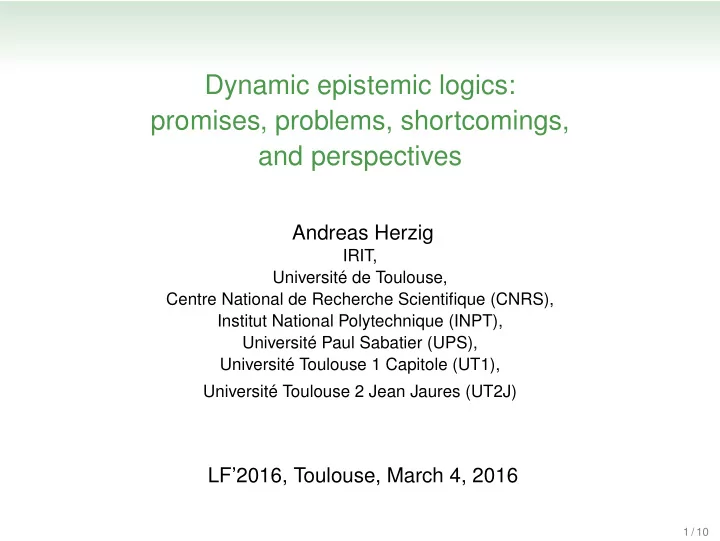

Dynamic epistemic logics: promises, problems, shortcomings, and perspectives Andreas Herzig IRIT, Université de Toulouse, Centre National de Recherche Scientifique (CNRS), Institut National Polytechnique (INPT), Université Paul Sabatier (UPS), Université Toulouse 1 Capitole (UT1), Université Toulouse 2 Jean Jaures (UT2J) LF’2016, Toulouse, March 4, 2016 1 / 10
1986: first year of thesis database ◦ new_info � new_database the plan: design appropriate semantics find nice axiomatics prove completeness get famous how it went: good minimal change semantics take models of new info that are closest to old database wrt some distance measure (Winslett’s PMA, 1988) failed to find axiomatics: many tentatives, no good solution how it ended: paper with axiomatisation of case where new_info is a literal (atom or a negation of an atom), published 1988 changed thesis subject after one year 2 / 10
1990: the supervisor and the postdoc Hagenberg Castle, Austria, 1990 workshop of the ESPRIT project MEDLAR (“Mechanising Deduction in the Logics of Practical Reasoning”) 3 / 10
∼ 2000 DEL = Dynamic Epistemic Logics Amsterdam, Indiana, Liverpool, Toulouse, . . . only updates by literals moreover: updates of higher-order beliefs I believe Luis doesn’t know there is a feast ◦ there is a feast ! � it is common knowledge that there is a feast today: mini-tutorial on DEL hundreds of published papers explained in 10mn message: many open problems 4 / 10
Dynamic Epistemic Logics: language epistemic operators: “agent knows proposition” 1 Knw Andreas feast Bel Andreas ( ¬ Knw Luis feast ) dynamic operators: “proposition is true after event” 2 � Event � feast where Event can be: assignment of propositional variable (change in the world) Luis_in_auditorium := ⊤ N.B.: this is nothing but update where new info is literal! announcement (change of beliefs; no change in the world) feast ! more generally: Kripke models world = announcement and assignments accessibility relations: model agents’ perception of the event 5 / 10
Dynamic Epistemic Logics: semantics M , w | = Knw Luis feast iff for all w ′ Luis cannot distinguish from w , M , w ′ | = feast M , w | = � feast ! � ϕ iff M , w | = ϕ and M feast ! , w | = ϕ where M feast ! is the update of M by feast : eliminate from M all worlds where feast is false 6 / 10
Dynamic Epistemic Logics? not a modal logic in the strict sense 1 modal logic = set of formulas containing all classical propositional theorems, closed under uniform substitution, modus ponens and necessitation not closed under uniform substitution: [ p !] p is valid [ q ∧¬ Knw i q !]( q ∧¬ Knw i q ) is not Kripkean event models amalgamate syntax and semantics 2 [French, Hales & Tay, AiML 2014] : all event models can be constructed from private announcements to groups thea_is_henri ! Auditorium the PDL program operators almost always fails to be a conservative extension of the 3 underlying epistemic logic [Balbiani et al., AiML 2012] existential properties not preserved under world elimination 7 / 10
Dynamic Epistemic Logics? problems with Knw when we move from S5 to ‘better’ logics of 1 knowledge (cf. [Lenzen, Voorbraak] ) e.g. S4 . 2 conservativity fails, v.s. problems with Bel are worse 2 conservativity fails, v.s. requires extension by (multiagent) belief revision: | = Bel Luis ¬ feast → � feast ! � Bel Luis ⊥ some approaches exist [van Ditmarsch 2006]: . . . [Aucher, PhD 2007]: . . . [Baltag&Smets 2012]: based on safe belief (belief that will never be revised) ⇒ begs the question 8 / 10
Dynamic Epistemic Logics? evolution of the world: fairly unrelated to reasoning about 1 actions literature [Reiter,. . . ] elegant solution to the frame problem [de Lima, PhD 2008] no account of qualification problem no account of ramification problem evolution of epistemic states: does not provide an account of 2 communication yet speech act theory requires intentions! integrate (simple version of) Bratman’s theory of intentions [Xiao, Phd ongoing] 9 / 10
Conclusion Dynamic Epistemic Logics are nice more compact models mathematically simpler than product logics push the envelop: replace indistinguishability relation by ‘mental programs’ [Maffre, PhD 2016] (forthcoming) but there is still a lot to do! 10 / 10
Recommend
More recommend